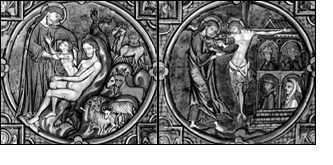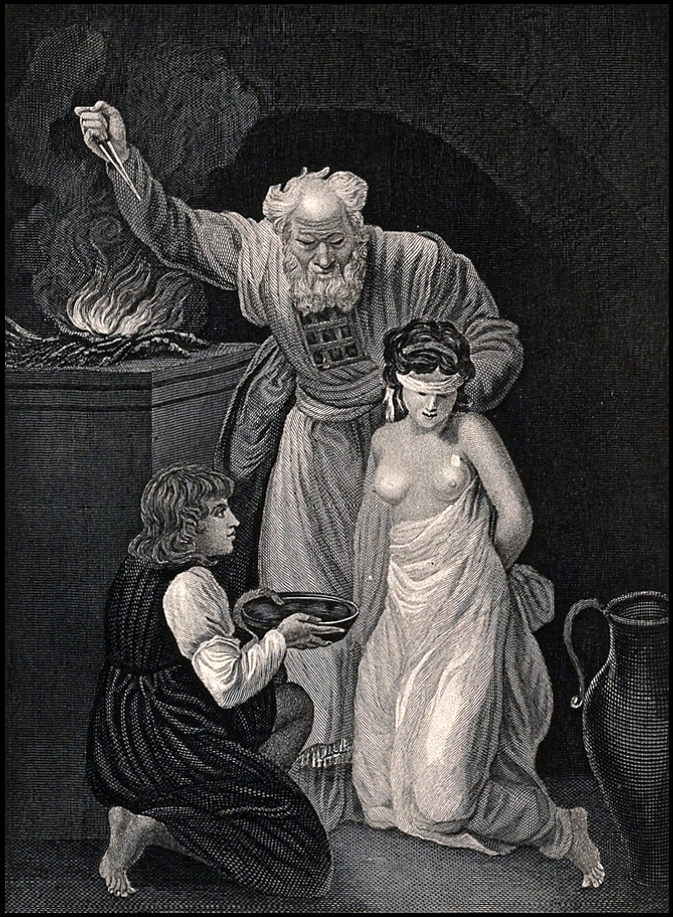 |
|
| |
| Class Prep |
|
|
| |
Jephthah's Daughter
 - Second-wave feminist Phyllis Trible published a book called Texts of Terror, analyzing the horrifying treatment of some female characters in the Hebrew Bible as examples of the patriarchal society that produced them. One of the "texts of terror" is the story of Jephthah’s daughter, whom Jephthah regretfully sacrifices to fulfill a reckless oath taken to secure a military victory.
-
- We'll examine the status of women in the ancient Near East (ANE) to better understand patriarchy, or the "rule of men" over them. We'll then use a third-wave approach to the biblical story to see what new issues it raises.
-
-
- Assigned Readings
-
- Primary:
- Secondary:
- Michael Coogan, God & Sex, 21-60 (course textbook)
- Esther Fuchs, Feminist Theory and the Bible, 71-94 (course textbook)
- online class prep
- Seminar Leadership Summary and Questions
-
- Slides for Lecture
-
-
- Today's Authors
-
| |
 |
Michael D. Coogan is a lecturer on the Hebrew Bible/Old Testament at Harvard Divinity School, Director of Publications for the Harvard Semitic Museum, editor-in-chief of Oxford Biblical Studies Online, and professor emeritus of religious studies at Stonehill College. He has published an introduction to the Old Testament, and has served as editor of The New Oxford Annotated Bible and The Oxford Encyclopedia of the Books of the Bible. |
| |
 |
Esther Fuchs (pronounced "fyooks") is Professor Emerita at the University of Arizona specializing in Near Eastern and Judaic Studies. An Israeli Jewish feminist scholar known for her work on on feminism and both Judaism and biblical texts. |
-
-
- Further Reading
-
- Bal, Mieke. "Between Altar and Wondering Rock: Toward a Feminist Philology." In Anti-covenant: Counter-reading Women's Lives in the Hebrew Bible (ed. Mieke Bal; Sheffield: Almond, 1989) 211-31.
-
- Caroselli, Susanna Bede. "The Dissemination of Jepthah's Daughter." In From the Margins, vol. 1, Women of the Hebrew Bible and Their Afterlives (ed. Peter S. Hawkins and Lesleigh Cushing Stahlberg; Sheffield: Sheffield Phoenix Press, 2009) 86-101.
-
- Exum, J. Cheryl. "Murder They Wrote: Ideology and the Manipulation of Female Presence in Biblical Narrative." Union Seminary Quarterly Review 43:1 (1989) 19-39.
-
- Fuchs, Esther. Jewish Feminism: Framed and Reframed, Feminist Studies and Sacred Texts Series. Lanham, Maryland: Lexington Books, 2018.
-
- --------. Sexual Politics in the Biblical Narrative: Reading the Hebrew Bible as a Woman. Sheffield: Sheffield Academic Press, 2000.
-
- Graybill, Rhiannon. "No Child Left Behind: Jephthah's Daughter with The Babylon Complex." The Bible and Critical Theory 11:2 (2015) 36-50.
-
- Sharp, Amie. "Jephthah and His Daughter." Journal of Feminist Studies in Religion 31:2 (2015) 127-8.
-
- Sjöberg, Mikael. "Jephthah's Daughter as Object of Desire or Feminist Icon." Biblical Interpretation 15:4 (2007) 377-94..
-
- Stone, Ken. "Animal Difference, Sexual Difference, and the Daughter of Jephthah." Biblical Interpretation 24:1 (2016) 1-16.
-
- Trible, Phyllis. "A Daughter's Death: Feminism, Literary Criticism, and the Bible." Michigan Quarterly Review 22:3 (1983) 176-89.
-
-
- Acknowledgements
-
- Image: John William Cook, "Jephthah's Rash Vow (Judg XI 39)," line engraving with stipple, after the painting by John Opie (1761–1807). 15.4 x 11.4 cm. London: The London Printing and Publishing Company. Reproduced on Wellcome Collection, online, https://wellcomecollection.org/works/
kaquytvf, accessed 22 January 2020.
|
|
| |
|
|
| | | |
